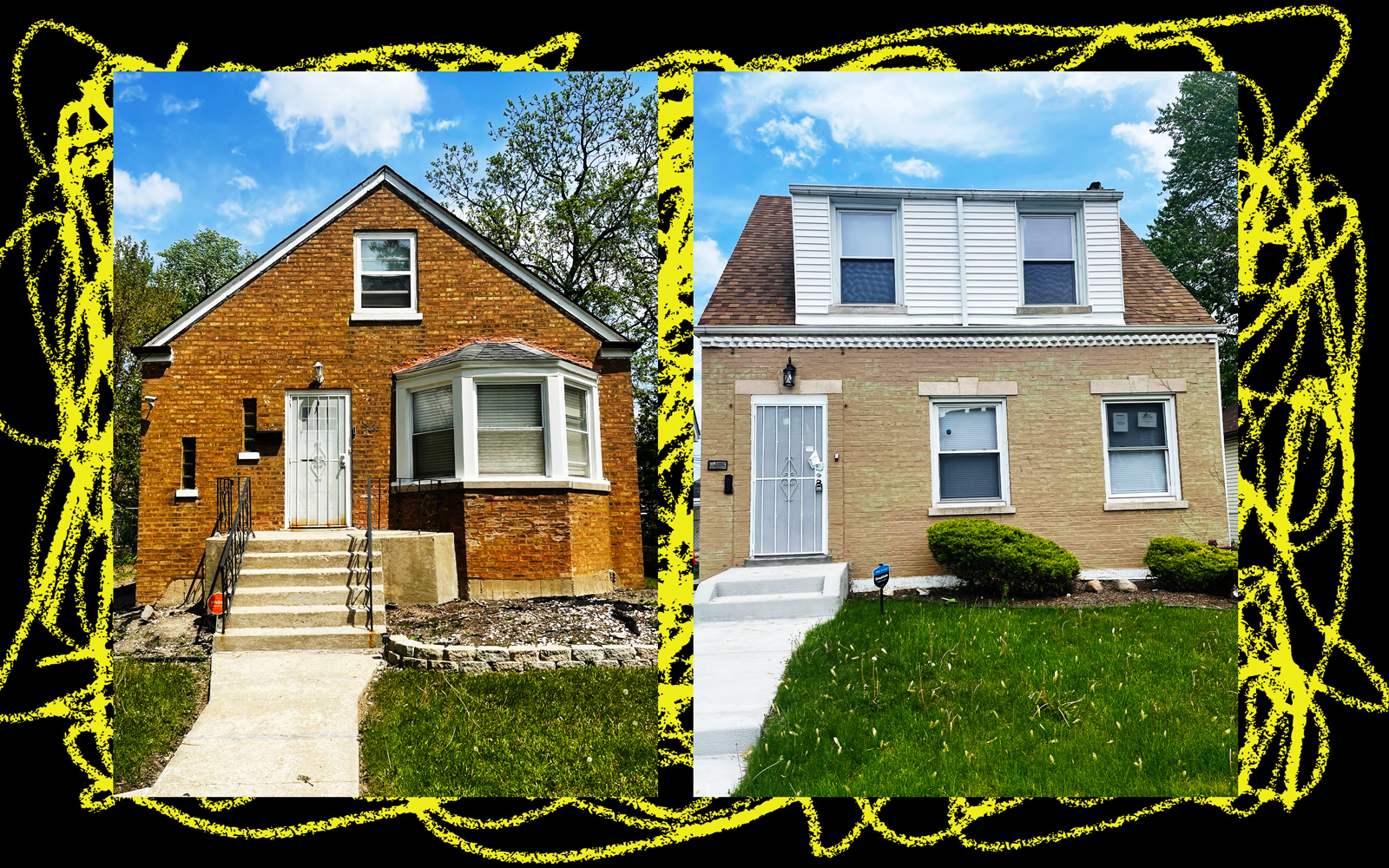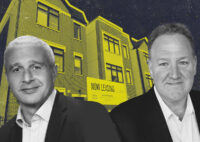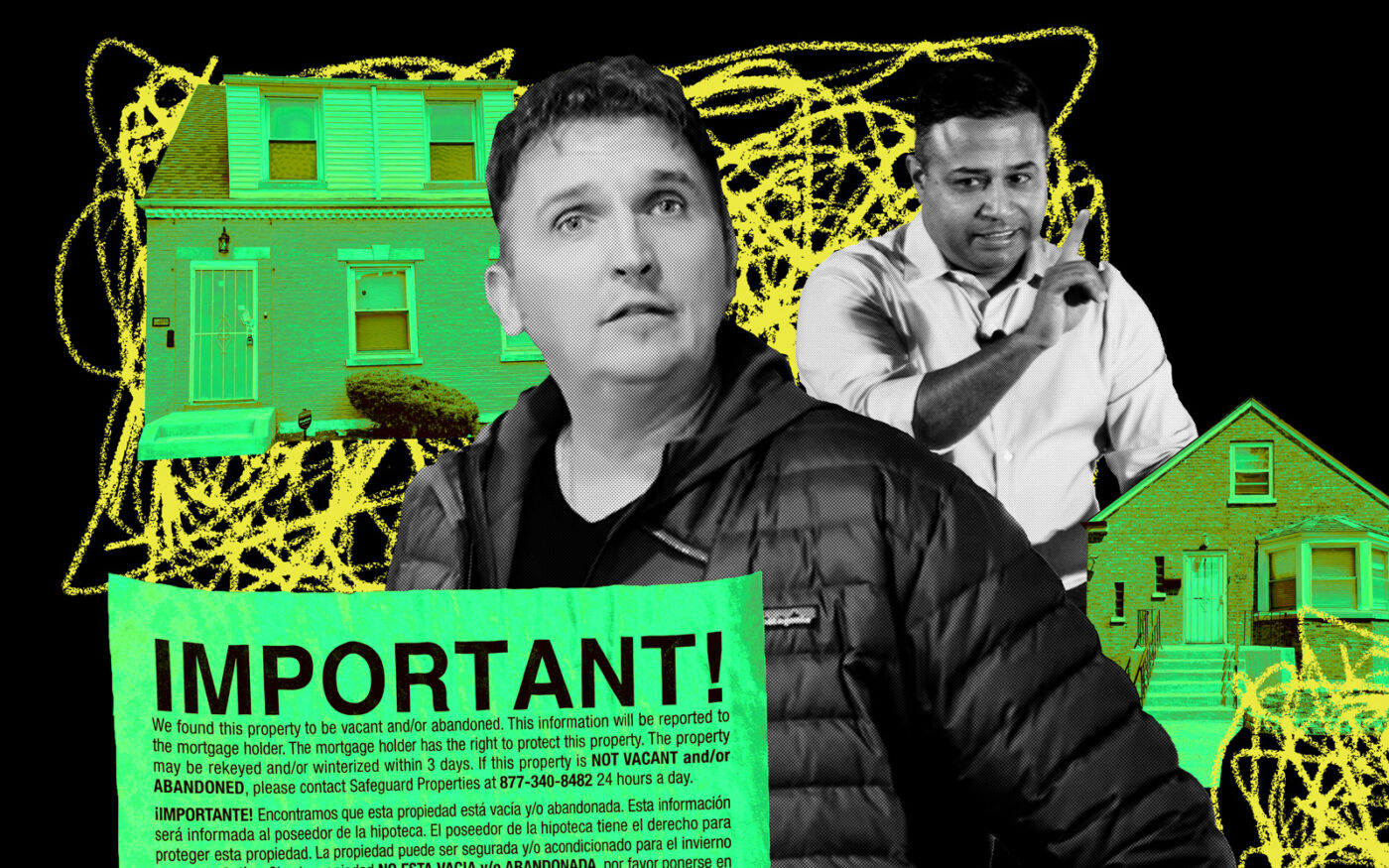Andrew Holmes congratulated South Side single-family investor Chris Urban on completing his 75th real estate deal in 2022, calling it a “huge accomplishment” and posting a video tour of the home, and Chris joked about losing count of how many properties he had rehabilitated.
About two years later, Holmes was warning fellow Chicago investors about Chris, who he accused of running a Ponzi-like scheme that required taking out loans from individuals to pay off other troubled single-family home debts.
Chris was good at talking people into lending to his real estate ventures, one lender said. He could be pushy even, but effective.
“I guess you’d say he’s pretty smooth,” said Mary Desloover, a retired attorney who loaned Urban more than $1 million in risky second-lien mortgages. Desloover worked with Chris and his sister, Aneta Urban, from 2019 through last year.

Desloover, Holmes and other investors are facing painful financial losses driven by the Urbans defaulting on dozens of loans, they said. They’re planning their next move against the developer as he also faces 80 foreclosures for loans originated by Chicago-based Renovo Financial.
The troubles with the Urbans’ portfolio threaten to extend a cycle of real estate distress that has depressed areas of the South Side for years as the rate of property tax increases, displacement and loan defaults outpaces the rest of Chicago.
So, what went wrong?
Map of CA Homes and Klu Homes Distressed Portfolio
Subscribe to TRD Data to unlock this content

Circle of masters
About six years ago, Chris and Aneta Urban set out to flip single-family homes across Chicago’s South Side and southern suburbs, offering some up for sale before venturing into single-family rentals. To source deals, they often worked with Community Initiatives, Inc, a nonprofit partnered with the city that’s tasked with getting homes out of foreclosure and code-violation hearings.
Community Initiatives, Inc., a subsidiary of Community Investment Corporation, sold the Urbans many homes from 2019 to 2024 through a program designed to put properties into the hands of local, responsible developers to rehab rundown homes.
Early this year, though, the Urbans’ lender Renovo Financial sued to foreclose on $13.7 million in loans issued across 80 properties all within a few weeks, court records show.
There’s at least $2 million more in debt the Urbans took on from individuals and alternative lenders, much of it as second mortgage liens on those homes. That money is now at risk of being wiped out in foreclosure. Some of those creditors are nervous, and angry.
As the Urbans dove into real estate, it helped to know Holmes. He’s the center of a network of Chicago real estate investors specializing in the risky business of buying cheap homes in lower-income neighborhoods — often out of foreclosure or from desperate sellers — with plans to fix them up and either resell them or fill them with renters.
Chris Urban wanted to get back into acquiring, rehabbing and flipping distressed properties after a previous attempt was thwarted by the 2008 housing collapse, he said in the video posted to Facebook three years ago.
That’s what brought him to the Andrew Holmes Mastery Program, an immersive real estate investment training program based in Lombard. Holmes promised to teach participants everything they needed to know to hack rentals and home flipping, and he even made introductions to potential private money lenders.
Holmes promotes his class through highly produced videos on YouTube and social media. The content often features him speaking to large crowds or superimposed onto a graphic holding a briefcase of money, for example. The Facebook group for his mastery program has 1,768 members.
As he does for many of his students, Holmes helped the Urbans make connections to begin investing after Chris completed the program. The two checked in regularly to talk business in the years that followed, until Chris was booted from the group last year.
One such connection was Desloover, the sole advisory board member listed on the website for one of Holmes’ companies, Chicago REIA. Desloover is also featured in one of Holmes’ videos recounting their first meeting when Desloover was so taken with one of his real estate talks that she offered to invest $1 million with him.
Chris Urban also “seemed like a nice person until recently, when all these things started happening,” Desloover said. She gave the Urbans more than $1.4 million in loans from 2019 through last year, property records show.
The Urbans purchased properties that had been through foreclosure and offered cash for homes on the South Side, working through three LLCs managed by them: CA Homes, CA Homes & Properties and Klu Homes. Chris handled the acquisitions and the rehabs while Aneta — a Chicago police officer — ran the rental side of the business, according to Chris Urban and Desloover.
They bought many of these properties from a subsidiary of Community Initiatives, Inc., which acquires distressed buildings with four units or fewer, sometimes through foreclosure auctions, and oversees rehabs done by local builders “to support the redevelopment of small residential buildings,” the agency said.
The Urbans kept the bulk of these properties as single-family rentals, including the 80-property portfolio now facing foreclosure from Renovo, Chris said.
Most of them were occupied by renters, or had been at some point, Chris said. But he couldn’t be sure, as he had been in the process of renewing leases when the foreclosures hit, he said.
Three properties that Desloover loaned him money to fix up fell behind on renovations, but he always called with a reason for the delays, she said. One had a squatter in the building; the other two had serious plumbing issues; and the city was “giving him problems with permits,” she recalled him saying.
In 2022, the city filed an administrative judgement against Klu Homes for failing to obtain a permit for plumbing work done on a home in the South Side neighborhood of Cottage Grove Heights, records show. The order required that Urban remove the work done illegally, obtain a permit, and hire a licensed plumber to re-do the work.
That was six months after Andrew Holmes Real Estate posted the Facebook video touring Urban’s 75th property.
The last three loans Desloover made to Urban were smaller and came at a time when she was being treated for cancer, she said. “He kept calling and calling, pushing and pushing.”
She wasn’t the only member of the Andrew Holmes Mastery Program loaning money to the Urbans.
Trouble brews
Members of the mastery program regularly loan one another money, and they have rough guidelines on how much can be loaned out at one time based on a member’s ability to pay back the debt, Desloover said.
She claims the Urbans broke this understanding when Chris began working with a woman named Shirley Pollock.
“He told her not to tell anybody, and in return, he was giving her 15 and 20 percent interest — huge amounts of interest,” Desloover said. “And she was not just investing for herself. I found out she was investing for other people.”
The Urbans received nearly $4.5 million in mortgage loans from Shirley Pollock, Christopher Pollock and LLCs operated by them, property records show. This was over the same five-year period that they were taking loans from Desloover, Renovo Financial and other individual lenders, who were often other connections made through the mastery program.
Desloover points to this as the moment when Urban started growing too fast, and she suspected that he started using new loans from members in the group, not for rehabs as promised, but to pay back other debt on his ever-growing list of lenders, she said.
Urban and the Pollocks began working together in the spring of 2021, ramping up over the next two years, records show.
“Up until then, he was doing five or six at a time and turning them over,” Desloover said. “He had a lot of cash-flowing rental properties.”
The Urbans stopped making interest payments on loans from Desloover about two years ago, she said.
Holmes also accused Urban of pocketing loans from people to use for other debts as well as vacations in Mexico and Poland.
Urban declined to answer questions about Holmes, the mastery program or the loans he took from individuals, saying he and his attorney are “in litigation and not allowed to comment at this time.”
Most of the earlier renovations took place as promised, but there were “40 or 45 properties that I know of where he just kept borrowing more and more and more money from different investors, and he never rehabbed those properties,” Holmes said. “After a while, the interest payments started getting slower and slower and slower.”
After hearing the same story from a few investors last fall, Holmes said they confronted Chris and Aneta Urban.
The Urbans took out $14.3 million in mortgages across 101 properties and later refinanced most of them with Renovo Financial, records show. Almost all of the Renovo loans are now in default, according to Illinois court records.
Holmes said he was unaware of the full extent of the Urbans’ debt until last fall and would have discouraged program participants from working with the Urbans if he had known.
When he found out, Holmes loaned Chris $220,000 to help him catch up on renovations on a few properties and “restructure” his business, he said.
Holmes later kicked Urban out of the mastery program and put a message out warning his students not to loan Urban any more money.
The meltdown
Property records revealed a pattern in the Urbans’ borrowing.
They would purchase a property for cheap, somewhere between $50,000 and $150,000, spending $8.2 million on 101 properties. They would then take out an initial construction loan for roughly 160 percent of the purchase price from Renovo, Desloover or — in one-third of the cases — the Pollocks and LLCs managed by them.
From there, loans would be refinanced with other individuals or Renovo Financial, or both, until debt on 80 of the 101 properties ended up with Renovo, records show. Renovo pooled the debt into a few trusts, allowing for outside investment in the notes, and U.S. Bank was appointed as the trustee for the packages of loans.
Renovo didn’t return requests for comment. Attempts to reach the Pollocks were unsuccessful.
Chris and Aneta had already decided to sell off the 80 properties by the time they started having trouble keeping up with their mortgage payments to Renovo last year, Chris said. Aneta didn’t want to manage the rental side of the business anymore, so they began listing their single-family rentals for sale, he said.
“Renovo and us, we had an agreement,” Chris said. “They were getting money for the mortgage from our sales. And at this time, we didn’t have enough money to pay all the mortgages.”
“We decided on selling before, but Renovo said they couldn’t wait because they are a third party,” he said. “So, they have to answer to the bigger investors.”
He pushed back on the word “foreclosures,” claiming that the court filings are a technicality and that they are working with Renovo to sell the homes, many to larger investment firms, before they can be seized through court.
Many of the Urbans’ loans from mastery program students were also in some stage of default leading up to the Renovo foreclosures, Holmes said.
That prompted Shirley Pollock to turn to Desloover for help in December, when the Urbans’ alleged failure to pay interest on Pollock’s loans left her unable to make payments to the people who were investing with her, Desloover said.
Holmes said he pushed Urban to let Desloover and other mastery program investors file second liens against his properties to help them get paid out for their share of the homes’ equity if they are sold through foreclosure.
Many did, meaning the parties may need to go to court to divvy up proceeds from any future sales. The second-lien lenders also face the risk of being wiped out and their debts not being repaid if the homes fail to fetch high enough prices. Properties in foreclosure rarely trade for much more than their first mortgage loans.
Selling collateral
Meanwhile, the Urbans were racking up municipal code violations with the city, first for the unpermitted plumbing work and later for dumping trash on their properties, creating the potential for rat infestations. They accumulated nearly $17,000 in penalties, unpaid utility bills and fees, according to judgments filed against them.
This came to a head last year, when the city’s department of law filed a lawsuit against the Urbans on two South Side properties, one of which was sold to them by Community Initiatives, Inc.
The complaints claim the homes were vacant and open, had water or fire damage, exposed and rotted rafters and other “dangerous and unsafe conditions.” Chris dismissed those complaints as a misunderstanding, saying a city building inspector came by during the demolition of a property while the construction crew was at lunch.
A city spokesperson said they “cannot comment on ongoing litigation or settlement negotiations.”
No one from the mastery class has sued the Urbans yet, but Holmes has been encouraging them to take action. As a former attorney, Desloover said she knows it can be difficult to prove fraud allegations.
As they fell behind on renovations to six properties acquired with a loan from Desloover, Chris Urban worked out a deal with her to sell the properties before renovations were complete so that she could get some of her investment back sooner, Desloover said.
The proceeds from the sales would cover part of what he owed her, and he promised to make her whole on the remaining debt by giving her second lien positions on a dozen other properties he owned, she said.
“I was very reluctant because I don’t like giving up first on something,” Desloover said of the deal. “On the other hand, I’m an ill person, elderly, and the idea of not getting any money back for a year and a half, and knowing now that he owed some other people — I didn’t know the extent of it at that time — I finally decided to do it.”
Desloover’s second mortgage lien for just under $1.2 million was recorded against 11526 South Aberdeen Street in Chicago, among other properties, to be paid off by the Urbans over time, property records show.
That same day in mid-October, the Urbans sold the property without Desloover’s knowledge, she said. In March of this year, they did the same with a property at 9005 South Union Avenue in Princeton Park, records show.
“When you sell a property, you have to sign an affidavit saying there’s no known encumbrances on it,” Desloover said. “So, I think we have a pretty good way of demonstrating that he committed fraud.”
Read more



